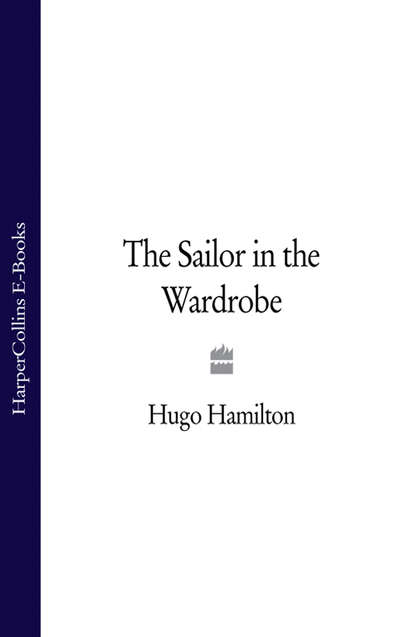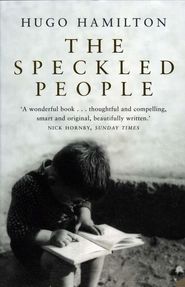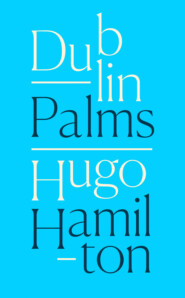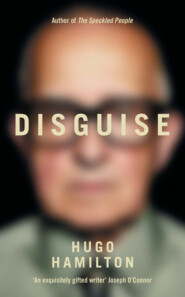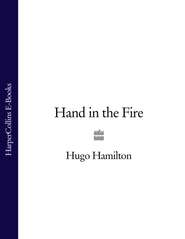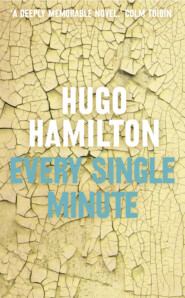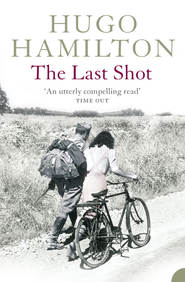По всем вопросам обращайтесь на: info@litportal.ru
(©) 2003-2024.
✖
The Sailor in the Wardrobe
Настройки чтения
Размер шрифта
Высота строк
Поля
The Sailor in the Wardrobe
Hugo Hamilton
Following on from the success of ‘The Speckled People’, Hugo Hamilton's new memoir recounts the summer he spent working at a local harbour in Ireland, at a time of tremendous fear and mistrust.Young Hugo longs to be released from the confused identity he has inherited from his German mother and Irish father, but the backdrop of his mother’s shame at the hands of Allied soldiers in the aftermath of the Second World War, along with his German cousin’s mysterious disappearance somewhere on the Irish West Coast and the spiralling troubles in the north, seems determined to trap him in history. In an attempt to break free of his past, Hugo rebels against his father’s strict and crusading regime and turns to the exciting new world of rock and roll, still a taboo subject in the family home.His job at the local harbour, rather than offering a welcome respite from his speckled world, entangles him in a bitter feud between two fishermen – one Catholic, one Protestant. Hugo listens to the missing persons bulletins going out on the radio for his German cousin, and watches the unfolding harbour duel end in drowning before he can finally escape the ropes of history.
HUGO HAMILTON
The Sailor in the Wardrobe
For Máire
Special thanks to Petra Eggers, Nina Härte,
Rainer Milzkott, and also to Arcadia in Potsdam
Die Zerrissenheit ist unsere Identität. Disconnectedness is our identity.
Hans Magnus Enzensberger
Table of Contents
Title Page (#ud0395236-b734-581e-b156-4fdb2a7fd5fe)
Dedication (#ua8c5d66d-49f4-53f1-90a8-a4cad1b135bb)
Epigraph (#u8a948762-85a3-5fa2-9e75-8b88ca018f5a)
One (#u1f02435a-d09a-5ceb-8f7c-bca3e3233261)
Two (#uaacd8af3-e233-5ea2-b1cf-b40b0cd060ad)
Three (#u26a94a42-382c-50d3-8e34-5f1a1a6317a3)
Four (#uff56b7d3-f76b-55ed-9124-c37fc96db1e9)
Five (#u5e6f2f74-c1ca-5608-80b7-5b5728099a14)
Six (#u469dbe5b-f2c9-5975-8e8e-3dcf718f23e5)
Seven (#litres_trial_promo)
Eight (#litres_trial_promo)
Nine (#litres_trial_promo)
Ten (#litres_trial_promo)
Eleven (#litres_trial_promo)
Twelve (#litres_trial_promo)
Thirteen (#litres_trial_promo)
Fourteen (#litres_trial_promo)
Fifteen (#litres_trial_promo)
Sixteen (#litres_trial_promo)
Seventeen (#litres_trial_promo)
Eighteen (#litres_trial_promo)
Nineteen (#litres_trial_promo)
Twenty (#litres_trial_promo)
Twenty-one (#litres_trial_promo)
Twenty-two (#litres_trial_promo)
About the Author (#litres_trial_promo)
Praise (#litres_trial_promo)
Also the Author (#litres_trial_promo)
Copyright (#litres_trial_promo)
About the Publisher (#litres_trial_promo)
One (#ulink_bb02b4fe-1209-5244-850c-101081eb6cb3)
People say you’re born innocent, but it’s not true. You inherit all kinds of things that you can do nothing about. You inherit your identity, your history, like a birthmark that you can’t wash off. We have our Irish history and our German history, like an original sin. We are born with our heads turned back, but my mother says we have to face into the future now. You have to earn your own innocence, she says. You have to grow up and become innocent.
The front door of our house is wide open. She has opened all the windows as well, to let in the air. There is no wind, only the long net curtains in the front room floating a little and the hum of summer all around the house. The floor has been polished and we have the solstice shining along the hallway. Once, my father brought us up to Newgrange in the car and told us about the winter solstice, how the sun reaches right into the megalithic tomb at Christmas and lights up the inner chamber. He says it’s like a piece of knowledge entering into the mind. Now we have the first summer solstice shining through our house, lighting up the shadowed places. For a few moments, the sun is reflected against one of the top windows on the red-bricked terrace across the road and beams right in through the hallway. It bounces off the wooden floor and off the carved oak trunk and shines right through into the kitchen at the back. It doesn’t last long, but while it does, there is a glint on every door handle, on vases, on picture frames, so bright that it makes you almost blind. All you can see is the white shape of the door frame and the fanlight.
On the roof of the breakfast room, my father is looking after the bees. I go outside to help him and watch him stepping carefully around the hives. We’re like two astronauts out there, standing on top of a strange planet with square bee-keeping cages around our heads, working in silence. He signals to me with his big glove and I hand him the smoker, and then the stainless steel lever so he can lift out the frames to make sure the bees are not thinking of swarming. The bees don’t like to be exposed to the light. They cling to the frames like a moving beard, listening to the restless thoughts in his mind. I can hear their tiny voices in thousands, like one strong, fizzing growl, as if they’re already planning to kill him. For the moment there is a truce, and we close up the hives again. We put away the bee-keeping gear and he tells me to come down into the front room.
‘There’s something I want you to know,’ he says.
He closes the door. The atmosphere is solemn. My mother is already sitting down, waiting.
‘I think you’re old enough to hear this,’ he says. He wants me to know what happened when the war was over and my mother was trying to get home. I have been chosen to receive this message from the past, a story about the British, one that we have to sit down for.
My mother talks about the phosphor bombs that rained down on the cities and about the final defeat, about the last shot being fired and the time of liberation, when everybody was finally on their way home. She remembers the feeling of freedom that was in the air that summer, like the smell of grass. She had to make her way back from Czechoslovakia where everybody was still running away from the Russians. She was on a German army truck with the Russian tanks no more than half a kilometre behind, cutting across the fields to try and head them off. In the end she got away only because of the mud everywhere and the roads so full of people that the Russians couldn’t catch them. At the border, the German soldiers changed out of their uniforms and became civilians again. She remembers seeing a mound of helmets and guns lying beside the road. She was lucky because she cycled through the Fichtel mountains with an officer who had secretly decided to hold on to his gun and then saved her life. All the way down to Nuremberg they had to take the highest roads by day and hide in the forests by night. It was the start of a beautiful hot summer, she says, but the officer was already married, so they had to say goodbye to each other and she continued on her way home, getting a lift with the American soldiers back towards the Rhineland.
Then we come to the part of the story that my father is waiting for. He has a frown on his forehead and his lips are pushed forward, listening to every word. My mother explains how, at the British checkpoint, she was brought into a compound where everybody was being processed. The men were separated from the women. She had to show her papers and answer questions about where she had been and what she had done with her life. The men were taken away and the officer in charge ordered all the women to line up outside. Around sixty to eighty women in all, my mother says, young and old, standing in a line while the officer walked up and down with a clipboard under his arm that had all their names on it. With the strong sunlight in their eyes, they could hardly see much more of him than the black outline of his uniform. There were trucks going past and a smell of diesel and dust in the air. There was an airfield somewhere close by too, because they could hear planes landing and taking off in the distance.
The officer then ordered them to undress down to the waist. An interpreter shouted out the order, but most of them understood the words in English. It didn’t look like a medical examination and the women looked around at each other, afraid of what was going to happen next. They obeyed and stood semi-naked with the trucks going by and the soldiers staring at them, whistling from up high as they passed. Some of the soldiers shouted things out, but their accents were hard to understand, even when they used German words like ‘Fräulein’.
Hugo Hamilton
Following on from the success of ‘The Speckled People’, Hugo Hamilton's new memoir recounts the summer he spent working at a local harbour in Ireland, at a time of tremendous fear and mistrust.Young Hugo longs to be released from the confused identity he has inherited from his German mother and Irish father, but the backdrop of his mother’s shame at the hands of Allied soldiers in the aftermath of the Second World War, along with his German cousin’s mysterious disappearance somewhere on the Irish West Coast and the spiralling troubles in the north, seems determined to trap him in history. In an attempt to break free of his past, Hugo rebels against his father’s strict and crusading regime and turns to the exciting new world of rock and roll, still a taboo subject in the family home.His job at the local harbour, rather than offering a welcome respite from his speckled world, entangles him in a bitter feud between two fishermen – one Catholic, one Protestant. Hugo listens to the missing persons bulletins going out on the radio for his German cousin, and watches the unfolding harbour duel end in drowning before he can finally escape the ropes of history.
HUGO HAMILTON
The Sailor in the Wardrobe
For Máire
Special thanks to Petra Eggers, Nina Härte,
Rainer Milzkott, and also to Arcadia in Potsdam
Die Zerrissenheit ist unsere Identität. Disconnectedness is our identity.
Hans Magnus Enzensberger
Table of Contents
Title Page (#ud0395236-b734-581e-b156-4fdb2a7fd5fe)
Dedication (#ua8c5d66d-49f4-53f1-90a8-a4cad1b135bb)
Epigraph (#u8a948762-85a3-5fa2-9e75-8b88ca018f5a)
One (#u1f02435a-d09a-5ceb-8f7c-bca3e3233261)
Two (#uaacd8af3-e233-5ea2-b1cf-b40b0cd060ad)
Three (#u26a94a42-382c-50d3-8e34-5f1a1a6317a3)
Four (#uff56b7d3-f76b-55ed-9124-c37fc96db1e9)
Five (#u5e6f2f74-c1ca-5608-80b7-5b5728099a14)
Six (#u469dbe5b-f2c9-5975-8e8e-3dcf718f23e5)
Seven (#litres_trial_promo)
Eight (#litres_trial_promo)
Nine (#litres_trial_promo)
Ten (#litres_trial_promo)
Eleven (#litres_trial_promo)
Twelve (#litres_trial_promo)
Thirteen (#litres_trial_promo)
Fourteen (#litres_trial_promo)
Fifteen (#litres_trial_promo)
Sixteen (#litres_trial_promo)
Seventeen (#litres_trial_promo)
Eighteen (#litres_trial_promo)
Nineteen (#litres_trial_promo)
Twenty (#litres_trial_promo)
Twenty-one (#litres_trial_promo)
Twenty-two (#litres_trial_promo)
About the Author (#litres_trial_promo)
Praise (#litres_trial_promo)
Also the Author (#litres_trial_promo)
Copyright (#litres_trial_promo)
About the Publisher (#litres_trial_promo)
One (#ulink_bb02b4fe-1209-5244-850c-101081eb6cb3)
People say you’re born innocent, but it’s not true. You inherit all kinds of things that you can do nothing about. You inherit your identity, your history, like a birthmark that you can’t wash off. We have our Irish history and our German history, like an original sin. We are born with our heads turned back, but my mother says we have to face into the future now. You have to earn your own innocence, she says. You have to grow up and become innocent.
The front door of our house is wide open. She has opened all the windows as well, to let in the air. There is no wind, only the long net curtains in the front room floating a little and the hum of summer all around the house. The floor has been polished and we have the solstice shining along the hallway. Once, my father brought us up to Newgrange in the car and told us about the winter solstice, how the sun reaches right into the megalithic tomb at Christmas and lights up the inner chamber. He says it’s like a piece of knowledge entering into the mind. Now we have the first summer solstice shining through our house, lighting up the shadowed places. For a few moments, the sun is reflected against one of the top windows on the red-bricked terrace across the road and beams right in through the hallway. It bounces off the wooden floor and off the carved oak trunk and shines right through into the kitchen at the back. It doesn’t last long, but while it does, there is a glint on every door handle, on vases, on picture frames, so bright that it makes you almost blind. All you can see is the white shape of the door frame and the fanlight.
On the roof of the breakfast room, my father is looking after the bees. I go outside to help him and watch him stepping carefully around the hives. We’re like two astronauts out there, standing on top of a strange planet with square bee-keeping cages around our heads, working in silence. He signals to me with his big glove and I hand him the smoker, and then the stainless steel lever so he can lift out the frames to make sure the bees are not thinking of swarming. The bees don’t like to be exposed to the light. They cling to the frames like a moving beard, listening to the restless thoughts in his mind. I can hear their tiny voices in thousands, like one strong, fizzing growl, as if they’re already planning to kill him. For the moment there is a truce, and we close up the hives again. We put away the bee-keeping gear and he tells me to come down into the front room.
‘There’s something I want you to know,’ he says.
He closes the door. The atmosphere is solemn. My mother is already sitting down, waiting.
‘I think you’re old enough to hear this,’ he says. He wants me to know what happened when the war was over and my mother was trying to get home. I have been chosen to receive this message from the past, a story about the British, one that we have to sit down for.
My mother talks about the phosphor bombs that rained down on the cities and about the final defeat, about the last shot being fired and the time of liberation, when everybody was finally on their way home. She remembers the feeling of freedom that was in the air that summer, like the smell of grass. She had to make her way back from Czechoslovakia where everybody was still running away from the Russians. She was on a German army truck with the Russian tanks no more than half a kilometre behind, cutting across the fields to try and head them off. In the end she got away only because of the mud everywhere and the roads so full of people that the Russians couldn’t catch them. At the border, the German soldiers changed out of their uniforms and became civilians again. She remembers seeing a mound of helmets and guns lying beside the road. She was lucky because she cycled through the Fichtel mountains with an officer who had secretly decided to hold on to his gun and then saved her life. All the way down to Nuremberg they had to take the highest roads by day and hide in the forests by night. It was the start of a beautiful hot summer, she says, but the officer was already married, so they had to say goodbye to each other and she continued on her way home, getting a lift with the American soldiers back towards the Rhineland.
Then we come to the part of the story that my father is waiting for. He has a frown on his forehead and his lips are pushed forward, listening to every word. My mother explains how, at the British checkpoint, she was brought into a compound where everybody was being processed. The men were separated from the women. She had to show her papers and answer questions about where she had been and what she had done with her life. The men were taken away and the officer in charge ordered all the women to line up outside. Around sixty to eighty women in all, my mother says, young and old, standing in a line while the officer walked up and down with a clipboard under his arm that had all their names on it. With the strong sunlight in their eyes, they could hardly see much more of him than the black outline of his uniform. There were trucks going past and a smell of diesel and dust in the air. There was an airfield somewhere close by too, because they could hear planes landing and taking off in the distance.
The officer then ordered them to undress down to the waist. An interpreter shouted out the order, but most of them understood the words in English. It didn’t look like a medical examination and the women looked around at each other, afraid of what was going to happen next. They obeyed and stood semi-naked with the trucks going by and the soldiers staring at them, whistling from up high as they passed. Some of the soldiers shouted things out, but their accents were hard to understand, even when they used German words like ‘Fräulein’.





